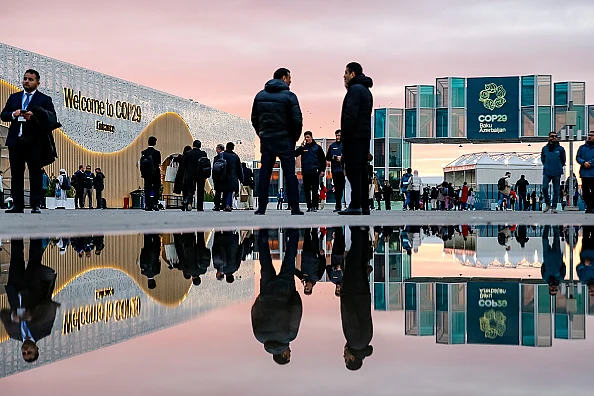One week into COP29, long-standing divisions between developed and developing countries have flared up. Critical negotiations like climate finance and equitable responsibility for action have come to the fore, with India saying that developed nations have failed to meet their commitments to climate finance.
COP29 Deadlock And A Rebuke From India
The first week of the COP29 conference in Baku concluded with India sharply criticising developed nations for failing to meet their financial commitments and little to show in substantive agreements.

Climate Finance and Historical Reality of Emissions
COP29’s primary objective this year is to finalise a New Collective Quantified Goal (NCQG) for climate finance, which will replace the initial 100 billion US dollar annual commitment from 2025. However, the draft NCQG has been shortened to 25 pages from 35, and over 400 bracketed items remain unresolved.
Representing Like-Minded Developing Countries, India said developed nations must commit to 1.3 trillion US dollars annually until 2030, with at least 600 billion allocated to grants.
An Indian negotiator said on November 14 that nearly two-thirds of climate finance comes in the form of loans when the need of the hour is grants and concessional funding. Pointing out that nearly two-thirds of climate finance comes in the form of loans when the need of the hour is grants and concessional funding, the negotiator said, “The real amount mobilised so far has been less than encouraging.”
India pointed out that loans make up nearly 70 per cent of climate finance provided so far. Calling this “unacceptable,” India’s lead negotiator Naresh Gangwa said it “places undue pressure on developing economies.” Simon Stiell, the Executive Secretary of the UN Framework Convention on Climate Change (UNFCCC), added that “Without bold measures, no economy will be spared from climate-driven losses.”
India’s comments came as the European Union is pushing for its Carbon Border Adjustment Mechanism (CBAM). CBAM, which is meant to curb the carbon footprint of imported goods, said India and other developing nations placed an unfair burden on growing economies while ignoring the historical reality of emissions.
The BASIC bloc said developed nations are attempting to shift additional obligations onto emerging economies. The Alliance of Small Island States (AOSIS) and the Arab Group joined forces with India, demanding scaled-up financial and technological support.
A Bolivian negotiator added that CBAM “shifts the responsibility of climate action onto nations with minimal historical emissions, undermining industrial growth in the developing world. "
India had expressed dissatisfaction on behalf of the G-77 counties and the BASIC bloc— comprising Brazil, South Africa, India, and China. The developing nations voiced frustration with the slow progress during a closing plenary on November 16. “Developing countries are being asked to increase mitigation ambition by those who have not shown any,” read a statement from Indian representatives.
Cosima Castle of E3G, an environmental consultancy, said the upcoming G20 Summit in Rio de Janeiro could break the deadlock. “G20 countries, responsible for 80 per cent of global emissions and 85 per cent of the world economy, hold the key to unlocking ambitious climate agreements,” said Castle.
The BASIC bloc also pointed out that the crucial Adaptation Fund for supporting vulnerable communities has only reached a sixth of its target amount—only 61 million US dollars against its 300 million dollar target. Mikko Ollikainen, the fund’s head, said that adaptation efforts require between 200 and 400 billion dollars yearly. It was noted that the COP26 decision to double adaptation finance by 2025 would likely be delayed to 2030.
Climate Technology
During week one, developing countries also pushed for equal access to climate technologies and dedicated financial support.
“Without equitable access to climate technologies, the promises of the Paris Agreement will remain unfulfilled,” Gangwa pointed out.
India also said it would not tolerate external regulations on its climate targets, saying they were disrespectful of its national sovereignty. The country’s negotiators further argued that mitigation efforts must align with Nationally Determined Contributions (NDCs).
Next Stop: G20 Summit
Set to begin on November 18, the G20 Leaders’ Summit could be a turning point for the stalled negotiations of COP29. Ana Toni, Brazil’s National Secretary for Climate Change, said it was important that G20 leaders send a solid signal to that effect.
Stiell also urged the G20 to prioritise debt relief, multilateral bank reforms, and increased grant-based financing. “Climate finance progress outside of our process is equally crucial, and the G20’s role is mission-critical,” he wrote in a November 16 letter.
-
Previous Story
 UNGA Votes For 'Immediate' Ceasefire In Gaza; Israeli Forces Continue To Attack Syria | Latest On West Asia
UNGA Votes For 'Immediate' Ceasefire In Gaza; Israeli Forces Continue To Attack Syria | Latest On West Asia - Next Story















